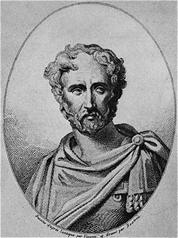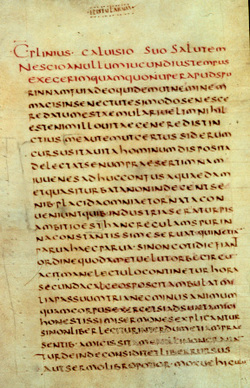Pliny was carefully educated by now famous teachers including Quintilian and became "The most eloquent leader of his time." Although Pliny at a young age served in the military it was not his passion. He went on to become a lawyer, author and magistrate of Ancient Rome. During Pliny's growth he was expected, as were most young boys of his status and wealth, to be educated. Pliny's thorough education is portrayed through his writings as for a 17 year old boy he uses very formal language and a serious tone.
Pliny is considered to have constructed the only primary written account of the eruption that survived as letters exchanged between Pliny and Tacitus mention the volcanic activity and the events in which his uncle died "As the commander of the fleet on the 24th of August when between 2 and 3 in the afternoon my mother drew his attention to a cloud of unusual size and appearance." Although "The cloud was rising from a mountain-at such a distance we couldn't tell which" The fact that Pliny mentions that his uncle "He had had a sunbath, then a cold bath, and was reclining after dinner..." allows us to assume that the sun was shining and there was either a small amount or no cloud cover. However as his mother pointed out the abnormal cloud Pliny wrote "I can best describe its shape by likening it to a pine tree. It rose into the sky on a very long "trunk" from which spread some "branches." I imagine it had been raised by a sudden blast, which then weakened, leaving the cloud unsupported so that its own weight caused it to spread sideways. Some of the cloud was white, in other parts there were dark patches of dirt and ash." This exact description of the volcanic eruption allowed scientists to understand how it erupted and the possible causes of death. However Pliny was considered to have had over imaginatively described the eruption until 1980 when an eruption in North America acted in the same fashion (a gas eruption).
Pliny is considered to have constructed the only primary written account of the eruption that survived as letters exchanged between Pliny and Tacitus mention the volcanic activity and the events in which his uncle died "As the commander of the fleet on the 24th of August when between 2 and 3 in the afternoon my mother drew his attention to a cloud of unusual size and appearance." Although "The cloud was rising from a mountain-at such a distance we couldn't tell which" The fact that Pliny mentions that his uncle "He had had a sunbath, then a cold bath, and was reclining after dinner..." allows us to assume that the sun was shining and there was either a small amount or no cloud cover. However as his mother pointed out the abnormal cloud Pliny wrote "I can best describe its shape by likening it to a pine tree. It rose into the sky on a very long "trunk" from which spread some "branches." I imagine it had been raised by a sudden blast, which then weakened, leaving the cloud unsupported so that its own weight caused it to spread sideways. Some of the cloud was white, in other parts there were dark patches of dirt and ash." This exact description of the volcanic eruption allowed scientists to understand how it erupted and the possible causes of death. However Pliny was considered to have had over imaginatively described the eruption until 1980 when an eruption in North America acted in the same fashion (a gas eruption).

"Ash was falling onto the ships now, darker and denser the closer they went. Now it was bits of pumice, and rocks that were blackened
and burned and shattered by the fire." This quote describes the tons of ash that fell down upon Pompeii and Herculaneum as the Column of debris, mud and ash collapsed and turned day into night. "It was daylight now elsewhere in the world, but there the darkness was darker and thicker than any night."
The reactions of the citizens of Pompeii is also described by Pliny as they were aware of the dangers yet the were not aware of what the best option for safety was "They discussed what to do, whether to remain under cover or to try the open air. The buildings were being rocked by a series of strong tremors, and appeared to have come loose from their foundations and to be sliding this way and that. Outside, however, there was danger from the rocks that were coming down, light and fire-consumed as these bits of pumice were. Weighing the relative dangers they chose the outdoors; in my uncle's case it was a rational decision, others just chose the alternative that frightened them the least." This explains the mixture of people found both indoors and outdoors at the time of their death.
In Letter 6.20 to Tacitus Pliny describes the after math including the tsunami that took place due to the violent eruption of Vesuvius "it seemed as though the sea was being sucked backwards, as if it were being pushed back by the shaking of the land. Certainly the shoreline moved outwards, and many sea creatures were left on dry sand." This is however seen as a contradiction because although tectonic plates are the cause of tsunamis and they had suffered quite a beating, there was no evidence to identify that a tsunami had taken place. This possibly leads to the speculation that a minor tsunami occurred.
Pliny himself was forced to flee the land "We decided to leave the town finally; a dazed crowd follows us, preferring our plan to their own..." He not only mentions his own escape but describes in depth the atmosphere that surrounded him "Behind us were frightening dark clouds, rent by lightning twisted and hurled, opening to reveal huge figures of flame. These were like lightning, but bigger. "
The reactions of the citizens of Pompeii is also described by Pliny as they were aware of the dangers yet the were not aware of what the best option for safety was "They discussed what to do, whether to remain under cover or to try the open air. The buildings were being rocked by a series of strong tremors, and appeared to have come loose from their foundations and to be sliding this way and that. Outside, however, there was danger from the rocks that were coming down, light and fire-consumed as these bits of pumice were. Weighing the relative dangers they chose the outdoors; in my uncle's case it was a rational decision, others just chose the alternative that frightened them the least." This explains the mixture of people found both indoors and outdoors at the time of their death.
In Letter 6.20 to Tacitus Pliny describes the after math including the tsunami that took place due to the violent eruption of Vesuvius "it seemed as though the sea was being sucked backwards, as if it were being pushed back by the shaking of the land. Certainly the shoreline moved outwards, and many sea creatures were left on dry sand." This is however seen as a contradiction because although tectonic plates are the cause of tsunamis and they had suffered quite a beating, there was no evidence to identify that a tsunami had taken place. This possibly leads to the speculation that a minor tsunami occurred.
Pliny himself was forced to flee the land "We decided to leave the town finally; a dazed crowd follows us, preferring our plan to their own..." He not only mentions his own escape but describes in depth the atmosphere that surrounded him "Behind us were frightening dark clouds, rent by lightning twisted and hurled, opening to reveal huge figures of flame. These were like lightning, but bigger. "

Although the letters of Pliny are the only surviving primary eye witness account, they do not come with out their limitations. Pliny was of a reasonably young age of around 17 at the time of the eruption and did not write about the event until 25 years later when he revisited the event in order to share with Tactilus "The mind shudders to remember ... but here is the tale." Pliny was also not a volcanologist nor a scientist and because of his lack of understanding we must take into account that this could possibly undermine the reliability of his words. If there were other surviving accounts it would create a more reliable account. The description of the tsunami is also seen as a limitation because there is no archaeological evidence to suggest that a tsunami occurred. Although there are limitations Pliny's documentation provide us with an insightful account of the events that occurred during the eruption of Mt Vesuvius and the life of the Roman of the first century.
Seen above is an image of one of
the letters of Pliny the younger.
Seen above is an image of one of
the letters of Pliny the younger.
